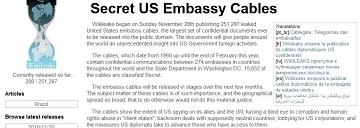 The Cutline
The CutlineWaPo jumps into the Guardian-NYT fray

The Washington Post's Paul Farhi follows up now on The Cutline's Sunday report detailing how The Guardian gave the 250,000 cables it received from WikiLeaks to the New York Times.
Farhi writes that The Guardian's original request for anonymity "was lifted Sunday evening as the stories began to break" -- with no mention of how news of the two papers' source agreement actually broke.
If the agreement was "lifted Sunday," as Farhi claims, then perhaps someone should have informed the New York Times.
When I contacted New York Times executive editor Bill Keller and Washington bureau chief Dean Baquet early Sunday afternoon, after the paper published its first WikiLeaks-related stories, they confirmed that WikiLeaks wasn't their direct source for the cables. Still, the Times editors wouldn't name the paper's actual source. That wasn't unusual. Journalists don't reveal sources unless the sources do so publicly or give them clearance to do so.
On Sunday night, I confirmed that there was a Guardian-Times source agreement and published a second post, roughly eight hours after the first WikiLeaks stories were published online. Even then, Keller wouldn't confirm that The Guardian was the paper's source.
Keller did so Monday morning after getting clearance from The Guardian to do so.
Besides the Guardian-Times agreement, Farhi does add some new details to why the Wall Street Journal and CNN opted not to make agreements with WikiLeaks.
WikiLeaks apparently asked them to sign confidentiality agreements to see a portion of the documents. If they broke the embargo and published any of the contents earlier, the Journal and CNN would have had to pay about $100,000 to the online whistle-blower.
